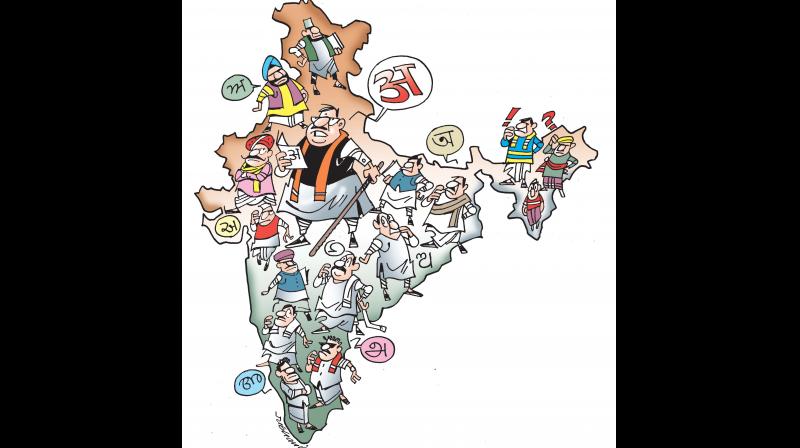A red herring and a red rag

A month after President Pranab Mukherjee extolled the virtues of diversity,
he made a surprising announcement that all official speeches should be
made in hindi. We cut through the noise to find out what this really means.
The Union ministry of home affairs’ March 31, 2017, notification of the Presidential Order accepting the recommendations of the committee of Parliament on official language is nothing more than a routine affair. That it should be dug out of the bureaucratic pile and given an airing smacks of Hindi politics associated with Hindi-Hindu heartland’s Bharatiya Janata Party (BJP), which is in power at the Centre, and in all of the Hindi-speaking states in north India excepting Bihar and Himachal Pradesh. But the political furore that the news has created needs to be played down. Hindi is not going to swamp the country. There are both political and cultural reasons why it cannot do so. We will talk about them a little later in this piece. First, there is need to pay attention to the facts of the case.
The committee had made 117 recommendations, and the one that got most prominence among others, that the President and others should make their official speeches in Hindi, stands at 105. It is not an injunction but a recommendation couched in officialese: “All dignitaries, including President and all ministers, especially who can read and speak Hindi may be requested to give their speech/statement in Hindi only.” This recommendation has been accepted, but this would not mean that President Pranab Mukherjee in his last two months in office — his term ends in July — will switch to Hindi in haste.
Read | National language and the Hindi hegemony
The committee’s first recommendation is a lament, a gripe. It says, “The committee has observed that the recommendations prepared with collective wisdom are not being deeply analysed by the department of official language. Thus, effective orders are not being issued on the recommendations made by the committee due to which fruitful results are not achieved. Therefore, the committee suggests that the department of official language before issuing final orders on the recommendations may hold discussions with the committee. After issue of orders, the department of official language may pursue their implementation in all ministries/departments of the Government of India, in a time-bound matter.” This recommendation has been accepted by the home ministry. But it is unlikely, that in the foreseeable future, the Government of India will become Hindi-ised.
There are a couple of significant, and ominous, depending on the point of view, recommendations which have been rejected. For example, recommendation 110 has been rejected which said, “There should be a provision for punishment for not complying to the Official Language Act.” Recommendation 108, which said, “There should be a provision for all the candidates willing to get employed in Central government offices to pass Hindi competitive exam in accordance with the post” has been rejected.
Read | Tamil pride, not Hindi hatred, drives movement
It seems that while the Hindi proponents, who can be inoffensively labelled as Hindi-wallahs, are always looking for ways to push Hindi as far as they can, there are enough sensible people in political parties and in governmental institutions who are deeply aware that this project of pushing Hindi cannot be taken too far because of practical difficulties.
Hindi, despite official backing, has not managed to gear itself up to make itself an eligible language to meet the needs and challenges of governance on the one hand, and of raising itself to the level of easy communication in the fields of science and technology, economics, philosophy and literature. There are not enough translations into Hindi from other India and foreign languages. There are no competent and expansive translation bureaus in Hindi, and this would require funding. Hindi is not updated and not up to the mark to tackle changing society of 21st century.
Hindi is not alone in its inability to measure up to the technological needs. Most Indian languages do not seem to make the grade. If the Hindi advocates, and of course they are not to be clubbed with the zealots, are to cite the examples of Chinese, Korean and Japanese being successful economies managing without English, then they would have to study closely the huge efforts in translating science and technology stuff into their own languages.
Forgetting for the moment that multilingual India is not in the same position as monolingual China, South Korea and Japan, the Hindi or Tamil or Bengali experiment fails in their respective states. The challenges of translating the latest developments in all the fields into one’s own language remain almost unmet.
The best way for Hindi or any other Indian language to beat English is to master English well enough to translate everything that is on offer in English into Hindi so that there is no need for the Hindi-knowing person to make the effort to learn English and that too in such an unsatisfactory manner. This would require an army of Hindi speakers and writers who are polyglots, who know other languages, Indian and foreign, and bring back the intellectual treasures of other languages into their own. That is how English made its way in the world, translating stuff from Greek and Latin, French and German, Sanskrit, Arabic and Persian, Chinese and Japanese. This openness to other languages took English to the top of the table.
The general attitude of the Hindi proponents is one of grouse and resentment against English. This prevents them taking cues from the success of English. It has to be remembered that everyone, including Hindi-speakers, learn English because it offers advantages, opens up opportunities. The day Hindi makes the world accessible, even non-Hindi speakers in India will embrace Hindi. At the moment that it remains a distant goal. The committee on Official Language can make recommendations but they will not succeed.

